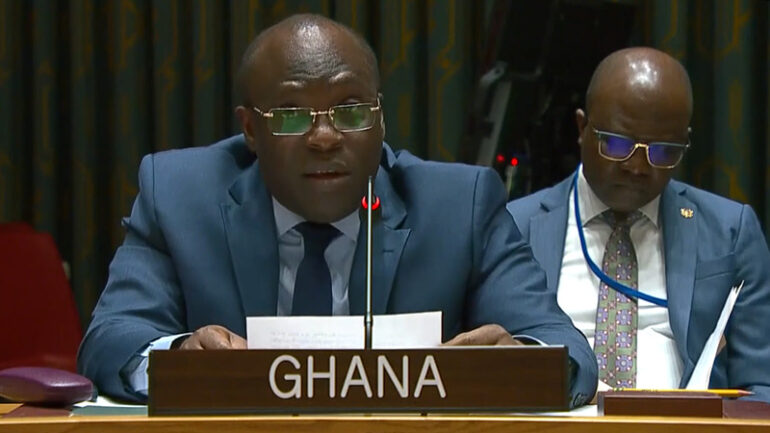UNSC Open Meeting on the Launch of an Intercontinental Ballistic Missile by the DPRK

AT AN OPEN MEETING OF THE SECURITY COUNCIL ON THE LAUNCH OF AN INTERCONTINENTAL BALLISTIC MISSILE BY THE DPRK
I thank ASG Khaled Khiari for his briefing to the Council and welcome the participation of the distinguished representative of the Republic of Korea. We continue to be gravely concerned by the escalating tensions on the Korean peninsula and the wider Northeast Asia region following the latest launch of an Intercontinental Ballistic Missile by the Democratic People’s Republic of Korea and two (2) short-range ballistic missiles, which they claim was in response to the ongoing joint military exercises between the US and the Republic of Korea. The current ICBM launch, which is reported to be a Hwasong-15, comes on the heels of eight (8) other ICBM launches and at least 73 ballistic missiles and missiles combining ballistic and guidance technologies, last year alone, all in clear violation of several Security Council resolutions. Ghana firmly deplores this present launch and others before it and we reiterate our call on the DPRK to comply with its obligations under the relevant Security Council resolutions, refrain from further ballistic missile launches, and return to compliance with the NPT, as well as IAEA safeguards.
Madam President,
We must acknowledge that the instruments of influence that the Council has wielded thus far, particularly its existing resolutions and sanctions have not been fully successful in stopping the DPRK’s weapons programme or eliciting their cooperation. As a Council, we must recommit to our common objectives and pursue the goals that are required to achieve concrete progress in furtherance of peace and security on the Korean peninsula. Throughout the Council’s meetings last year on this issue, and particularly during the two Consultations this year, there have been very strong calls by all members for the Council to be unified. We must therefore aspire to respond to the developments in the DPRK in a different manner by modifying our approach.
In this regard, we reiterate our call for the Council together with all the relevant stakeholders to begin the important task of rebuilding trust, solidarity and mutual respect, through dialogue and diplomacy, which takes into account, concerns of all members. We hope that the paths of mediation, which the Secretary-General also has at his disposal would not be closed but
rather prioritized for the objective of complete, general and irreversible denuclearization of the Korean Peninsula.
On sanctions, we note that they are an important tool in the toolbox of the Security Council for the maintenance of international peace and security. Sanctions are, however, not an end in themselves. We must address the unintended consequences of sanctions on the DPRK in a swift and all rounded manner. It is also important to evaluate thoroughly the DPRK sanctions regime to better understand the gaps that have enabled sanctions override and facilitation of its nuclear weapons programme without hindrance.
In closing, we must be reminded by the strength that lies in the unity of the Council. Collectively, we have been entrusted with a powerful mandate by the architects of the present order, to act on behalf of all Member States in maintaining international peace and security. This places a unique and heavy responsibility on all members of this Council, to not only reflect the immediate national interests of their capitals, but to work collectively in the global interest. We urge that we must therefore be bound together by this objective as we pursue to the business of working collectively in the global interest in furtherance of durable peace and security on the Korean peninsula.
I thank you for your attention.
